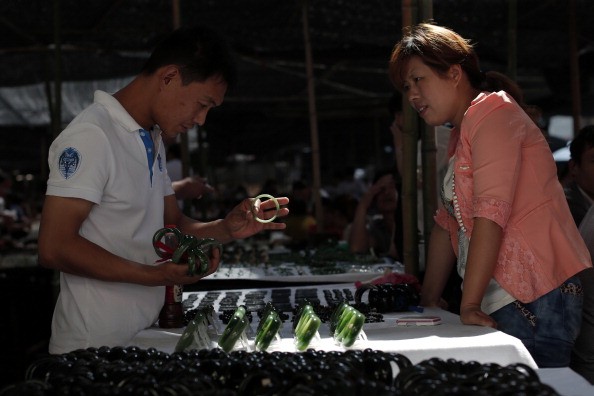China's jade and redwood traders are seeking to diversify their business as domestic demand drops and the Myanmar's new government tightening its grip over natural resources.
"The sales of high-end gemstones have been tepid the last two years," Kyaw Win Khaing, a Chinese-born Myanmar national who has been selling Myanmar jade in Ruili, Yunnan Province, reported the Global Times on Monday.
A local taxi driver was also quoted by the Global Times as saying that only a few buyers can now be found in Ruili's trading center and that several jade stores have already shut down.
Ruili, which is one of the three strategic China-Myanmar border towns along with Tengchong and Yingjiang, is widely known in Asia for its rich supplies of jade sourced from Myanmar.
However, China recent economic downturn and the central government's 2012 campaign on corruption and extravagant spending have led to a sharp slump in sales.
Kyaw said that jade buyers are now only interested in middle- and low-end products, which cost around 10,000 yuan ($1,501).
He also expressed concern over the future of jade trading, which is facing uncertainty under the leadership of Aung San Suu Kyi's National League for Democracy (NLD).
The NLD, which won an absolute majority in Myanmar's parliament in 2015, has said it would tighten regulation of the country's jade mines and clamp down on rampant exploitation and smuggling.
The jade industry in Myanmar is dominated by companies with links to ethnic armies and leaders of the previous military government, according to Reuters in 2015.
Myanmar, which supplies around 90 percent of the world's jade, produced $31 billion worth of the stones in 2014, equivalent to nearly half of the country's entire GDP, the London-based environmental advocacy group Global Witness wrote in a report in 2015.
In late July, Myanmar's mining authority said they will not renew mining licenses for jade and gems and would only consider granting new permits after new gemstone laws have been passed, according to the Myanmar Times.
"In the past, we could export jade easily, but now under the new government, the customs crackdown on jade smuggling is as strict as their fight against drugs," said Kyaw.
Aside from jade, Myanmar's redwood industry has also taken a hit.
A 40-year-old man surnamed Xie told the Global Times that he gave up selling luxury redwood furniture because it has become a "money-losing sector".
"I used to make 800,000 yuan per year through trading Myanmar redwood," Xie, who now makes a living as a taxi driver, told the Global Times on Monday.
According to data from Ruili's commerce and trade bureau, the first half of 2016 saw 5.25 billion yuan of imports passing through the city port, down 5.72 percent year-on-year. At the same time period, 9.4 billion worth of cargo, mainly hardware and construction building materials, was exported to Myanmar, a 5.62 percent increase year-on-year.



























